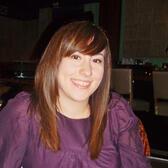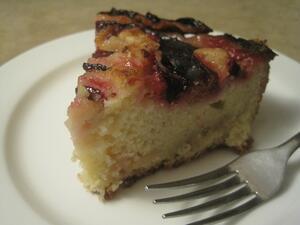Eating Jewish: Plum Kuchen
As I walked through the fruit and vegetable section of my local grocery store, I couldn’t help but notice the pile of oval shaped, deep purple Italian plums that were for sale. For weeks I had been buying deliciously juicy peaches and nectarines (of which every bite evoked summer), but it was impossible to ignore the dark color of these plums, which stood out against the bright oranges and reds of these other fruits, signaling the onset of fall. Aside from buying a few to eat that day, I knew I had to find a recipe that would highlight these fruits. It was only a few days later when looking through a few of my cookbooks to find some recipes for Sukkot, did I find one for plum kuchen in Marcy Goldman’s A Treasury of Jewish Holiday Baking. I had never baked with plums, but this seemed like a great recipe to start with and was a perfect way to showcase some seasonal fruits for this holiday.
Kuchen originates from Germany and was introduced into the American culinary landscape with the immigration of German immigrants in the 1800s. In his new book, The Encyclopedia of Jewish Food, Gil Marks explains, “kuchen is a generic German and Yiddish word for a baked good, although it generally specifies a cake […].” Such cakes were originally made with a yeast based dough but became easier and quicker to make with the creation of chemical leavening agents in the nineteenth century which led to their popularity as a dessert to serve during kaffee-klatsch (coffee chat) which was a time for women to socialize and drink coffee. As kuchen became more popular in the United States its name was changed because it sounded too foreign to many people. In turn, it became known as coffee cake, which was the anglicized version of kaffeekuchen.
This cake, with its mix of sweet and tart flavors, is extremely simple to make. It only requires one bowl, in which the batter is prepared. It is then simply a matter of spreading the batter into a round cake pan, placing the plums, which have been cut into quarters on top of the batter, and topping this all with cinnamon, sugar, lemon juice and butter. After it has been baked, the plums will turn a jewel like pink and their skin will look almost black, a beautiful contrast against the white of the cake. The sour cream batter bakes into a rich, moist cake that tastes subtly of lemon and almond. The plums retain their tartness and perfectly complement the sweetness of the cake. Although this cake is particularly delicious when made with plums, I think that any other fruit such as apricots, peaches or blackberries would also be delicious.
This is a recipe that I will undoubtedly be making over and over again due to its ease of preparation but more importantly because it was a wonderfully exquisite cake that was enjoyed by everyone who tried it. I hope that it can become a welcome addition to your own meals in the sukkah that helps to highlight the bounty of the harvest.
Plum Kuchen
From Marcy Goldman’s A Treasury of Jewish Holiday Baking
Kuchen
½ cup unsalted butter, softened
½ cup sugar
2 large eggs
¼ cup sour cream
1 teaspoon vanilla extract
½ teaspoon almond extract
Zest of 1 lemon, finely minced or grated
1 ½ cups all-purpose flour
¼ teaspoon salt
1 teaspoon baking powder
Topping
8 medium sized, quartered plums
Juice of 1 lemon
2 tablespoons sugar
½ teaspoon ground cinnamon
1 tablespoon unsalted butter, in small pieces
-
Preheat the oven to 350 degrees. Grease and flour a 10-inch springform pan or a round 9-inch pan (I used the latter because I didn’t have a springform pan on hand).
-
In a large bowl, cream the butter and sugar until smooth. Add the eggs, one at a time, then the sour cream, vanilla extract, almond extract, and lemon zest. Fold in the flour, salt and baking powder.
-
Spoon the batter into the prepared pan. Arrange the plums, cut side up, on top of the batter in a circular fashion around the pan until the surface is covered. Drizzle the lemon juice, sugar and cinnamon over the kuchen and dot with the pieces of butter.
-
Bake the kuchen for about 35 minutes until the plums have released their juices and the pastry is browned on top. Cool before removing the kuchen from the pan.








Glad to have found this article! Now I understand the term "cushion cake" better. I found it used repeatedly in the book, Tevye's Daughters by Sholom Aleichem, translated by Frances Butwin (1949, 1999). I grew up with kuchen. Somehow in the old world stories, when the translator said "cushion cake", I just didn't realize that he must have meant KUCHEN. Of course! - - By the way, my favorite food tale is the one "Two Shalachmones" where the two teen maids eat away at the plates of baked goods that they were to present to their mistresses' friends. Hilarious.
"Kuchen" is a fairly common term in Milwaukee (and my family), but this is a city where the default potato salad is German potato salad. My grandmother told me that in WWI, they tried to get the community to call sauerkraut "Liberty cabbage," but nobody would go along with it. Germans are stubborn.
The term is also used in Chile, which surprised the heck out of me when I lived there until I learned that there are cities in Chile where many of the folks still speak German.
I approved this comment, even though I take issue with it in a number of ways.
1. Asserting that something definitively "is" or "is not" Jewish assumes that there is a definition of what is or isn't Jewish. Is cake Jewish if Jews make and eat cake? The word "cake" in another language is hardly something we can definitively say "is" or "is not" Jewish.
2. Not all "Jewish" cake is dairy-free. Not all Jews keep kosher.
3. The only kind of Jew I might call "stupid" is one that assumes that their version of Jewishness is the only acceptable version of Jewishness. See my latest post on Jewish privilege.
There is a fine line between criticizing or disagreeing with a post, and calling it's author names. Let's try to keep things civil, shall we?
Kuchen is the German word for cake. It is like a torte made in a springform pan. Kuchen might have been adopted by the German Jews, but it is NOT a Jewish cake. German kuchen has dairy in it to make the cream filling. FYI... sour cream is dairy also. Oy! Stupid Jews lol
As a Jew-in-Training I've never had plum cake. This recipe looks quite delicious and I can't wait to make it!
I'm sure every Jewish person would say the same thing, but...
My mom makes the BEST plum cake!